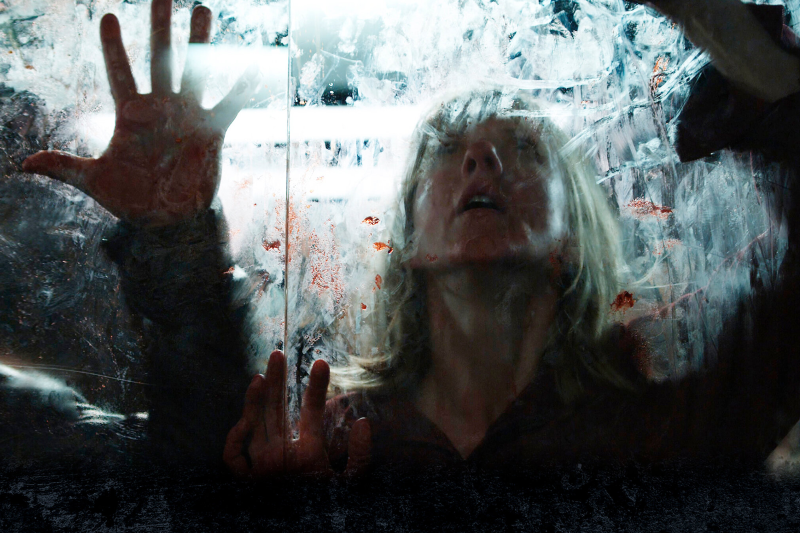As the window for nostalgia ticks endlessly forward, the cultural dominance of John Carpenter on independent filmmakers has slowly begun to fade. Now a generation of ‘90s kids has access to studio money, and we’re seeing the visual language of filmmakers like James Cameron become more prominent in genre cinema. One great example: Matthew McManus and Kevin McManus’s Redux Redux, a multiverse thriller that plays this week at the Fantasia International Film Festival. With a dash of quantum mechanics and a drop of Terminator 2, Redux Redux proves that there is still room for spectacle in indie cinema.
After the death of her daughter, Irene (Michaele McManus) has one goal: to travel the multiverse and hurt him, badly, countless times. And so Irene settles into a routine: traveling to a new universe and killing Neville (Jeremy Holm) in his home – always at close range, and always on payday.
But Irene’s routine is interrupted when she rescues another victim from his home. Mia (Stella Marcus) has already worked herself free by the time Irene visits the house, and she is just as hellbent for revenge as her universe-hopping savior. But for the first time, Irene begins to see a crack in her resolve, as she realizes that continuing on this path of revenge might mean digging three graves – one grave more than she’s willing to carry on her conscience.
In 2016, science fiction writer Blake Crouch published Dark Matter, a book about a physicist who is displaced in the multiverse after an alternate version of him decides he prefers that life to his own. What made Dark Matter – and its subsequent Apple TV+ adaptation – such a refreshing spin on multiverses was the scope of its narrative. Crouch leaned heavily into the minutiae of the multiverse theory, casting his characters adrift in universes with only a few small differences between them. While the book does off big swings, much of the story is rooted in the trauma of being tossed through the looking glass with no end in sight.
This same approach is found here. Multiverse stories have started to run their course in popular culture, but the McManus brothers present their concept with a refreshing lack of self-satisfaction. In the film’s best scene, for example, Irene and Mia are forced to barter with fellow “travelers” for a replacement battery for their machine, leading to a heated faceoff in a rundown bunker. The mundanity of the multiverse - that changes are minimal, and that travelers are so ubiquitous as to make quantum particles an out-of-pocket expense - allows Redux Redux to focus on its human elements, not the self-referential nature of its narrative.
At the heart of this human element is Irene, played to perfection by Michaela McManus. McManus carries the film’s science with a quiet competence and never steps on her trauma onscreen. In keeping with the film’s deference to a certain blockbuster filmmaker, she inspires comparisons to Linda Hamilton’s character in the original Terminator films: McManus conveys danger and competence in equal measure, and the film owes us very little time proving out her bonafides. The grand tension of the film – between big ideas and small stakes – balances perfectly in her hands.
Less fortunate is Marcus, who understands the anger and fierceness of her character but sometimes feels miscast in the role of a 15-year-old girl. Redux Redux wants Mia to be a daughter figure for Irene, but Marcus reads a half-decade too old on screen, drawing more natural parallels to the adult experiences that shaped Irene’s self-hatred. At times, this contrast between performer and performance causes the relationships to waver out of focus, introducing a touch of unsteadiness in an otherwise confident narrative. It is never enough to take us out of the movie, but it withholds that extra gear that might’ve made Redux Redux something for the ages.
Surprisingly, where Redux Redux truly shines is in its action economy. Hollywood is rife with indie science fiction that struggles to match big ideas with big visuals, but the McManus brothers save their bullets - pun intended - for when it matters most. We are treated to a crosstown police chase between Irene and the LAPD; we are also given a gunfight outside a local gas station that sells both the destruction of the environment and Irene’s proficiency with a gun. No one would have blamed the brothers McManus for going light on the set pieces, but the filmmakers allow themselves just the right amount of spectacle.
And those set pieces speak to what Redux Redux does best. There is a reason this one has become something of a festival darling since its premiere at SXSW: it is a film with big ideas (common) that is capable of seeing its vision through onscreen (less so). It’s an easy movie to root for, but it also works to win over moviegoers who are not predisposed to liking it.
That makes the film a bit of a unicorn: a work of independent cinema that can still play with audiences who never dig deeper than the first row of their recommendations tab. While the McManus brothers cannot control the multiverse fatigue that companies like Disney are barreling towards, they can at least show that these stories are more than just a gimmick. Redux Redux is a low-fi story of revenge and redemption, and one that seems destined to become an audience favorite sooner rather than later. [3.5/5.0]






